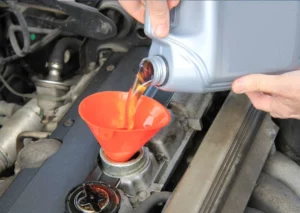Engine Elixir: The Importance of Regular Oil Changes for Auto Repair Service

Oil changes are the unsung heroes of auto maintenance, silently preserving the heart and soul of your vehicle—the engine. They are a vital component of routine car care, ensuring your engine operates smoothly, efficiently, and with longevity. In this blog post, we’ll dive deep into the world of oil changes, uncovering their significance, the science behind the oil, how often you should change it, the benefits of professional auto repair services, and why neglecting this simple maintenance task can have costly consequences.
The Significance of Regular Oil Changes
Regular oil changes are essential for several reasons:
- Lubrication
Oil reduces friction between engine components, preventing wear and tear. - Cooling
It carries away excess heat generated during combustion. - Cleaning
Oil traps and suspends dirt and debris, preventing engine contamination. - Seal Conditioning
It keeps gaskets and seals pliable, preventing leaks. - Fuel Efficiency
Fresh oil reduces friction, improving fuel economy.
The Science Behind Engine Oil
Engine oil is a carefully engineered mixture of base oil and additives. The additives provide:
- Viscosity
It determines the oil’s thickness, ensuring proper lubrication in varying temperatures. - Detergents
They keep engine internals clean by preventing sludge buildup. - Anti-Wear Agents
These additives reduce friction and protect critical components. - Corrosion Inhibitors
Prevent rust and corrosion in the engine. - Anti-Foaming Agents
Minimize foam formation, ensuring consistent lubrication.
Oil Change Frequency
Oil change intervals vary by vehicle and oil type, but a general guideline is every 3,000 to 5,000 miles for conventional oil and 7,500 to 10,000 miles for synthetic oil. Consult your vehicle’s manual or a professional mechanic for specific recommendations.
Benefits of Professional Auto Repair Services
Professional auto repair services offer several advantages for oil changes:
- Expertise
Skilled technicians perform oil changes accurately and efficiently. - Quality Oil
Reputable providers use high-quality oil and filters. - Comprehensive Inspection
Auto shops often include a thorough vehicle inspection. - Recycling
Proper disposal of old oil is eco-friendly and responsible. - Timely Maintenance
Regular service reminders help you stay on schedule.
The Consequences of Neglect
Neglecting oil changes can lead to:
- Engine Damage
Excess wear and tear can result in engine failure. - Reduced Fuel Efficiency
Dirty or low oil can decrease gas mileage. - Emissions Issues
Poor engine performance can lead to increased emissions. - Higher Repair Costs
Engine repairs are costly compared to routine oil changes.
Oil changes may seem mundane, but they are the lifeblood of your vehicle’s engine, ensuring it operates at peak performance for years to come. Understanding their significance, adhering to recommended change intervals, and entrusting this task to professional auto repair services are all essential steps in maintaining your vehicle’s health and reliability. So, the next time you schedule an oil change, remember that you’re not just giving your engine fresh oil; you’re providing it with the care it needs to keep purring like a well-tuned symphony on the open road.











